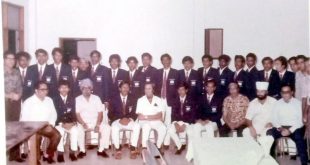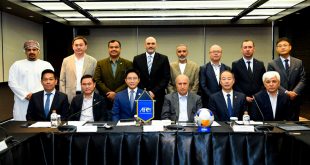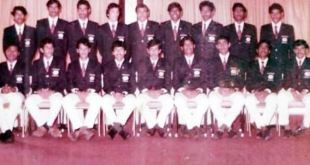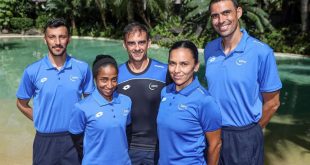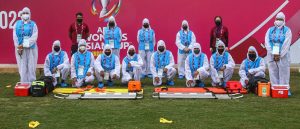 Medical practitioners have played a key role at the ongoing 2022 AFC Women’s Asian Cup – India, ensuring the safety and wellbeing of players, officials, representatives as well as the AFC delegation.
Medical practitioners have played a key role at the ongoing 2022 AFC Women’s Asian Cup – India, ensuring the safety and wellbeing of players, officials, representatives as well as the AFC delegation.
The COVID-19 pandemic has drastically altered the world’s landscape, with football also severely impacted. Join AFC Media as we speak to two of the many medical practitioners who have played major roles in the 2022 AFC Women’s Asian Cup – India.
AFC Medical Officer and Emergency Medicine physician, Dr Fenton De Souza, and in-house physician, Dr Samparna Bohidar both explain how bio-bubbles are now a vital part of sporting events.
“Biomedical bubbles are created by isolating the selected individuals in a well-defined space and all the individuals within the defined space get tested regularly,” said De Souza.
“With the current Omicron variant, the possibility of contracting the virus while at stadiums, training sessions, setting up of training sites and gyms is very high but the biomedical bubble helps restrict these possibilities.”
“It cannot be assured, however, that there is 100 percent protection even with all the stringent protocols that have been put in place.”
Dr Bohidar added, “There are certain protocols to follow during a biomedical bubble – keeping an eye on the fact – the spread of Omicron is about two to three times more infectious than the Delta variant among the vaccinated and boosted individuals, noting that segregation of biomedical bubble members from the outside population is mandatory.”
“Because of the shorter incubation period (72 hours or three days) of Omicron than the other variants like Delta, RT-PCR tests every 72 hours help in picking up positive cases on time and keeping a check on the spread.”
With all the safety protocols in place, both Dr De Souza and Dr Bohidar stressed that prevention is better than cure.
“The situation in India as of January 2022 has been very challenging with increased cases. All sporting events have been hampered by the virus but with the strict protocols and testing, we try our best to provide and maintain a safe environment to keep the participating athletes fit and healthy so that they can perform at the highest level on the field,” said Dr De Souza.
Important competitions like the AFC Women’s Asian Cup India 2022™, see mandatory testing every three days or 72 hours.
“Doctors in the competition must be ready to act immediately and to provide remedy for injuries that occur during training or in the competition. They will also need to check on any other medical issues that arise before and after the match,” said Dr Bohidar.
“Meanwhile, in-house doctors such as myself, must attend to patients either through voice call or video chat if they have contracted COVID-19. For the other patients, face to face consultation is possible provided that all SOPs are followed. Resident doctors will also have to attend any emergency inside the bubble, conduct RT-PCR tests on the delegates and follow up on all the medical cases inside the bubble.”
Dr De Souza added: “Doctors are needed to guide the participating teams regarding the current situation and to provide medical care to those who have or may have contracted the virus.”
“Additionally, the 72-hour testing cycle is important to isolate any COVID-positive individuals to stop the spread of the virus.”
Since the start of the COVID-19 pandemic, the AFC has successfully organised tournaments such as the AFC Asian Qualifiers – Road to Qatar, the 2022 AFC U-23 Asian Cup – Uzbekistan qualifiers, the 2020 and 2021 AFC Champions League and the 2021 AFC Cup, among others – with the tournaments all involving the implementation of biomedical bubbles.
 Arunava about Football A look at football & the world through my eyes!
Arunava about Football A look at football & the world through my eyes!
